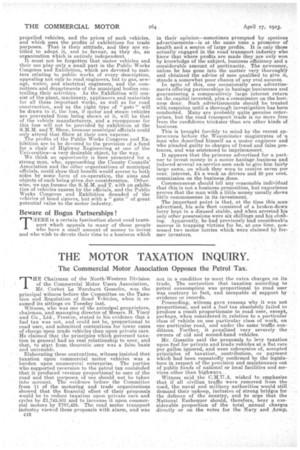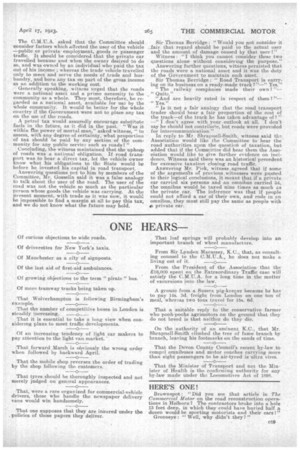THE MOTOR TAXATION INQUIRY.
Page 2

Page 3

If you've noticed an error in this article please click here to report it so we can fix it.
The Commercial Motor Association Opposes the Petrol Tax.
THE Chairman of the North-Western Division of the Commercial Motor Users Association, Mi. Corbet Le Merchant Gosselin, was the principal witness before the Committee on the Taxation mid Regulation of Road Vehicles, when it resumed, its sittings on Tuesday last.
Witness, who was one of the principal, proprietors, chairman, and managing director of Messrs. H. Viney and Co., Ltd , Preston, stated in his evidence that a fuel tax was not, and could not be, proportional to road user, and submitted contentions for hewer rates of charge upon trade vehicles than upon private cars. He claimed that the principles which governed taxation in general had no real relationship to user, and that, to start from theoretic user was a false basis and untenable.
Elaborating these contentions, witness insisted that taxation upon commercial motor vehicles was a burden upon commercial enterprise. The parties who supported reversion to the petrol tax contended that it produced revenue proportionalto user of the road and that purposes of use should not. be taken into aecount. The evidence before the Committee from 11 of the motoring and trade organizations showed that the financial effect of their proposals would be to reduce taxation upon private cars and cycles by 21,745,801 and to increase it upon commercial motors by £787,435. The road motor transport industry viewed these proposals with alarm, and was
not in a condition to meet the extra charges on its trade. The contention that taxation according to petrol consumption was proportional to road user was contrary to fact, and incapable of support by evidence or records.
Proceeding, witness gave reasons why it was not proportional, and said a fuel tax absolutely failed to produce a result proportionate to road user, except, perhaps, when considered in relation to a particular class of vehicle on one particular class of work, on one particular road, and under the same traffic conditions. Further, it penalized very severely the owners of old and second-hand vehicles.
Mr. Gosselin said the proposals to levy taxation upon fuel for private and trade vehicles at a flat rate per gallon ignored, and were subversive of, accepted principles of taxation contribution, or payment which had been repeatedly confirmed by the-legislature in respect of the provision and maintenance out of public funds of national or local facilities and services other than highways.
Witness said the C.M.11A. wished to emphasize that if all civilian traffic were removed, from the road, the naval and military authorities would still demand their upkeep, inclusive of strong bridges for the defence of the country, and to urge that the -National Exchequer should, therefore, bear a considerable proportion of the total annual charges directly or on the votes for the Navy and Army. The C.M.U.A.asked that, the Committee shOuld consider factors which affected the user of the vehicle —public or private employment, goods or passenger traffic. It should be considered that the private car travelled because and when the owner desired to do so, and was owned by an individual who paid the tax out of his income ; whereas the trade vehicle travelled only to meet and serve the needs of trade and husbandry, and bore any tax on part of the gross income as an addition to the working cost.
Generally speaking, witness urged that the roads were a national asset and a prime necessity to the community as a whole. They must, therefore, be regarded as a national asset, available for use by the whole community. It would be better for the whole country if the Government were not to place any tax on the use of the roads.
A petrol tax would assuredly encourage substitute fuels in the future, as it did in the past. ' "Was it within Me power of mortal man," asked witness, "to assess, with any degree of certainty, what proportion of tax should be paid by any section of the community for any public service such as roads?"
Concluding, the witness maintained that the upkeep of roads was a national obligation. If road transport was to bear a direct tax, let the vehicle owner know what his obligations to the State would be before he invested his capital in road transport.
Answering questions pet to him by members of the Committee, Mr. Gosselin said it was a false analogy to talk about the user of the road. The user of the i•oad was not the vehicle so much as the particular person whose goods the vehicle was carrying. At the present moment, with trade as it was now, it would be impossible to find a margin at all to pay this tax, and we do not know what the future may hold. Sir Thomas Berridge: "Would you not consider it _fair that regard should be paid to the actual user and the amount of damage caused by that user ?" Witness : "I think you cannot consider these two questions alone without considering the purpose." Answering further questions, witness persisted that the roads were a national asset and it was the duty of the Government to maintain such asset.
Sir Thomas Berridge: "Road Transport is carry
ing on its business on a ready-made track ?"-" Yes.„ ” The railwily companies made their own? "
" Quite." "And are heavily rated in respect of them? "— " Yes."
"Is it not a fair analogy that the road transport trader should .bear a fair proportion of the cost of the track—of the track he has taken advantage of ? " —"I don't agree with your outlook at all. I don't say he should not contribute, but roads were provided for intercommunication."
In reply to Mr. Shrapnell-Smith; witness said the Association would like the Committee to hear the road authorities upon the question of taxation, but added that if the Committee did hear them the Association would like to give further evidence on incidence. Witness said there was an historical precedent for excessive taxation closing road traffic.
Answering Mr. Pick, witness agreed that if some of the argunierfta of previous .witnesses were pusned to their logical conclusions, it meant that if a private car carried six persons and an omnibus carried al, the omnibus would be taxed nine times as much as the private car. The inference was that if people could not afford a car of their own, and rode in an omnibus, they must still pay the same as people with a private ear.






























